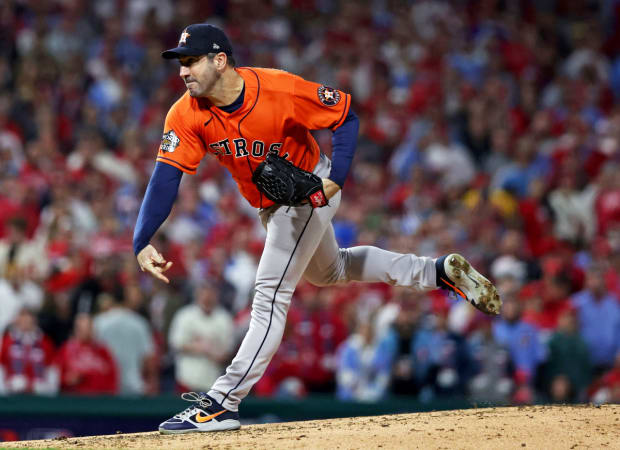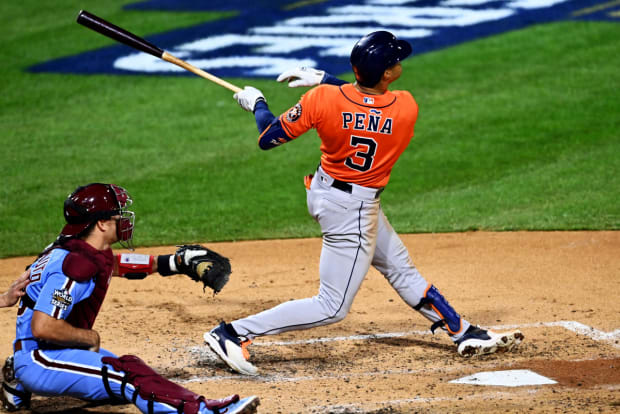PHILADELPHIA — The Astros will be returning to Houston with a World Series lead. They warded off a late Phillies comeback attempt to win Game 5, 3–2, putting them one win away from a championship.
Here are three quick takeaways:
Justin Verlander finally gets his World Series win

Bill Streicher/USA TODAY Sports
It wasn’t necessarily pretty. It began with giving up a home run. But for the first time in his career, Justin Verlander walked off the mound in the World Series while his team had a lead.
Verlander gritted his way through 94 pitches across five innings with spotty fastball command. He walked four—his most since June 29, 2019 (!)—but struck out six. This was not exactly the Verlander we saw mount an impressive case this year for the American League Cy Young. But he was effective when he most needed to be. (And his manager knew when to pull him—Verlander seemed to empty the tank for his last hitter, Nick Castellanos, who ultimately flied out after a 10-pitch AB.) He was rewarded for it with his first World Series win.
The Phillies’ bats disappear with runners in scoring position
Thursday night was better than Wednesday for the Phillies’ offense. But that’s not saying much. After getting no-hit in Game 4, they continued to struggle to get much going in Game 5, and they looked particularly frustrating with runners on. Before an eighth-inning RBI single from Jean Segura, they had been 0 for their last 20 with RISP, a hitless streak going back to Game 1. Yet breaking that drought ultimately did little for them. Segura’s hit was followed by a Brandon Marsh strikeout and Kyle Schwarber rocketed a groundout—the latter aided by some sharp defense by Astros first baseman Trey Mancini, yes, but it means they’re still 1 for their last 23 with RISP.
That’s a credit to the Astros. Their pitching staff—particularly their bullpen—is tremendous. But the Phillies are built on offense, and if they don’t want their season to end on Saturday, they need to find a way to do that.
The one bright spot for this offense? Bryce Harper. (C’mon: Were you expecting anyone else?) The Astros seemed determined not to throw him any breaking stuff. Yet he still made it work for him. He finished with two walks and a double. But the hitter behind him, Nick Castellanos, recorded an out every single time he came up with Harper on.
Jeremy Peña’s two-strike approach

Kyle Ross/USA TODAY Sports
This was the second night in a row that the rookie got a major hit in a two-strike count. In Game 4, he fell behind 0–2 to Aaron Nola before coming back to load the bases with a single. Tonight, he did that one better. Facing Noah Syndergaard in the third inning, Peña fell behind 0–2 again, whiffing on a slider and fouling off a curve. And then he started battling: He fouled off another pitch and waited patiently on two more, one inside and one outside, before he got what he was looking for. Syndergaard hung the 2–2 curve over the plate. Peña drove it into the left field seats. It would be the last batter for Syndergaard and the winning run for the Astros.
That’s interesting in part because two-strike hitting was not a particular strength of Peña’s in the regular season: In fact, it was an outright weakness. He was quite a bit worse than the average hitter with two strikes. (He had a .197 OPS in those counts—equal to a 77 sOPS+, meaning the league-average performance in those situations was 100.) But if ever there was a time to turn that around, of course, it’s November.







